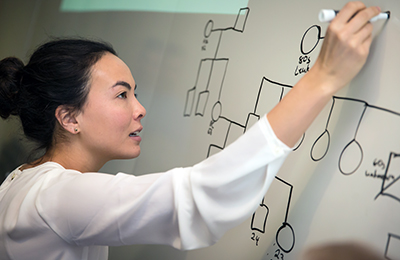

People turn to direct-to-consumer genetic test kits for a variety of reasons —to answer questions that family are unable to provide, to understand the genetic underpinning that makes you unique, or just sheer curiosity. But what do you do when the results arrive in the mail?
It may only seem natural to trek to your doctor for an explanation. Surprisingly, one breast cancer study found that many physicians lack the genetic knowledge to interpret results. Often, results lie between the guideposts of disease-causing and benign (variants of uncertain significance). When a readout is not clear cut, it is more challenging to formulate evidence-based health care decisions.
Medical schools are aware of this short-coming and many institutions are beginning to develop courses to enhance physician understanding of genomics. To accomplish this goal, University of Utah Health established the four-year Certificate in Personalized Health Care in 2012 to help the next generation of doctors develop the skills needed to practice medicine in the era of genomics.
“I think the certificate is to my medical degree like a minor is to an undergraduate student,” said Chad Hilton Webb, a first year MD/PhD student enrolled in the certificate program. “It shows that I sought out and developed additional skills during my education.”
Personalized health aims to shift medicine from a one-size-fits-all approach designed for the average patient to more targeted therapies designed to tackle the genetic variation unique to a specific patient. This innovative approach takes into account each individual’s genes, environment, and lifestyle.
“Physicians are seeing patients with genetic disease but few have the specialized skills to interpret genomic information, much less communicate this information to their patients,” said Emily Coonrod, PhD, Associate Director, Program in Personalized Healthat U of U Health. “We have expanded on this certificate program to train the next generation of medical professionals to be better equipped to help patients navigate complex health care decisions.”
Participants in the program obtain skills in understanding and communicating with their patients about health literacy, genome sequencing, inherited disease, and pharmacogenomics to name a few. Throughout the program, students will have the unique opportunity to work with a number of active interdisciplinary stakeholders in the Utah genomics community, including ARUP Laboratories, a national reference laboratory and nonprofit enterprise of the University of Utah, the Utah Genome Project, bioinformaticists, genetic counselors, and bioethicists. In addition, the program offers medical students hands-on genomics experience, including:
- communicating about direct-to-consumer genetic tests results and limitations;
- interpreting results of genomics-based medical tests;
- understanding the role of genetic counselors;
- understanding how drugs interact with a person’s specific genetic make-up;
- familiarity with bioinformatics tools to interpret genomic data;
- evaluating patient risk for disease based on genomic information; and
- applying genomic technologies in an ethical, legal, and socially appropriate way.
“I was impressed by how many different routes one can take this certificate,” Webb said. “It’s a versatile program that transcends many fields and can be personalized to focus on what interests you. It’s pretty empowering.”

Coonrod believes the skills developed during the certificate program will set graduates from the U School of Medicine apart from their peers as they compete for residency programs.
“This certificate program provides our students a platform that exposes them to patient stories and professionals who practice genetic medicine,” Coonrod said. “We are educating the next generation of health care practitioners that will meet the needs of an ever-evolving health care system.”
The Genetic Science Learning Center, part of the Human Genetics department at U of U Health, develops content for the certificate program as well as many resources on precision medicine and genetics, which are available to the general public.